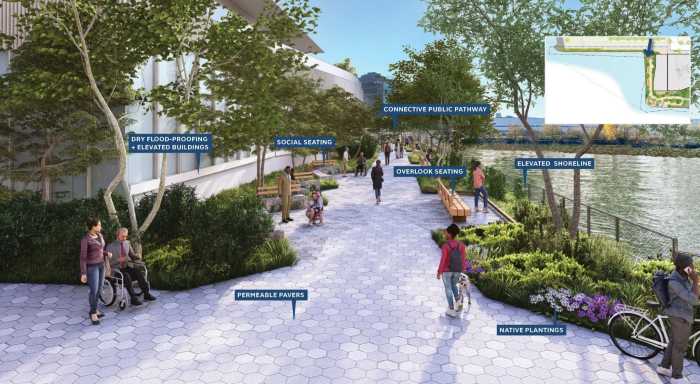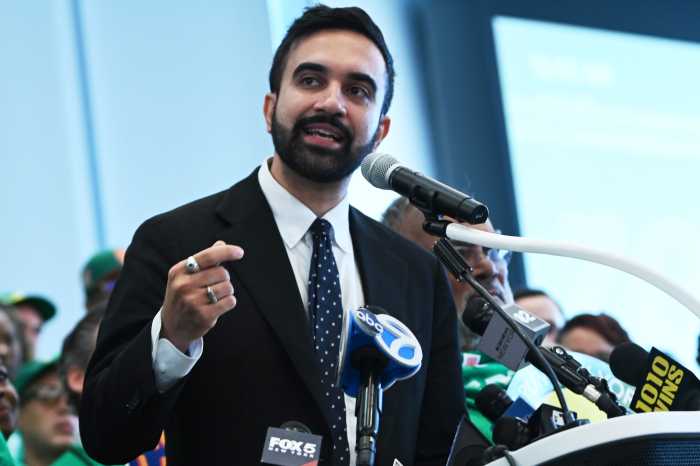Benjamin Weinthal, a New Yorker and Gay City News contributor who is living in Berlin, and his colleague Corinna Waffender, a Berlin journalist, sat down with Mayor Klaus Wowereit for an exclusive pre-election interview. Weinthal translated the interview from German.
Gay City News: Mr. Wowereit, Berlin has acquired the reputation with the red-red city government as a world-open city. This reputation attracts minorities, many of whom are gay and lesbian Poles, who feel discriminated against in their land. How do you view homophobia in Eastern Europe and especially in Poland? Does the situation concern us?
Mayor Klaus Wowereit: That does concern us. Especially with a land, which with the support of Germany, joined the European Union. I have also promoted, as the representative of the capital city in cooperation with Warsaw, the membership of Poland. It goes without saying that it is for us not unimportant that a parade, a demonstration for equal rights is simply prohibited. And admittedly not only with very problematic reasons, but also with arguments which show a contempt for humans. And when you see that people have to fear that they will be hit and injured, publicly discriminated against, and receive no police protection from opposition demonstrators, then you become anxious and fearful. Here you have to say something. Here you have to set clear priorities. Yet here the possibilities are limited. It has to arise from the Polish people. The Poles have at the same time to intercede so that something like this no longer occurs.
GCN: On the matter of education. Violence is spreading in Berlin’s elementary schools. Homophobia and anti-Semitic graffiti are not a rarity. Does there exist a need for a special upbringing and education program?
KW: There is unfortunately no automatic result from putting more money into the schools and getting less anti-Semitism or less intolerance. That has something to do with money, but not directly. More important is that we have a tolerant climate in this city, in which it is understood that we only have a chance together, regardless which religion, skin color, or way of life the people have. We need an open society which does not allow its openness to be prohibited and does not allow itself to be terrorized by a small number. The overwhelming majority of the population is, thank God, not so. We have to stand up where injustice occurs. That begins on a micro-level. At home, in the day care centers, in the school, in public, in the workplace.
GCN: Are there so-called “No-Go-Areas” in Berlin? That is, certain districts or regions in which members of minority groups have fear of being attacked?
KW: That should not be allowed to happen. There are certainly areas in large cities where you should perhaps not go in the evening or late at night. That is also a question of criminality and a sense of well-being. We should not allow areas to be defined by individuals who lay claim to say: “Foreigners are not allowed—or someone who is different—to come here”. That should not be tolerated. As far as that goes, I do not fundamentally dispute that that can take place. I do not think much, however, of naming specific areas. It can occur anywhere in the city that someone is hit or stomped because he by chance passes by and because he is not liked or looks different.
GCN: Will the recently implemented “Allgemeine Gleichbehandlungsgesetz,” [General Equal Treatment Law, in some aspects comparable to anti-discrimination civil rights legislation in the U.S.] bring us further on the matter of discrimination in the workplace ?
KW: Laws are one way. They have to be, in order that lawmakers make clear that equality is a general goal. But laws have to be filled with life and lived. That is more important.
GCN: How can that be achieved?
KW: Through tolerance education, quite simply. There are sufficient continuing education measures and pedagogical course materials which are capable of transmitting tolerance. But it has, in fact, to be lived—where something occurs, and you can never rule that out. A school, for example, has to tackle the problem. Not repress it. Or sweep it under the carpet. What’s the reason for it? Why are you doing that? And to initiate a discussion in the entire school. Not to look away, rather to show one’s face.
GCN: What is your opinion with respect to relevant equality themes in the politics of the family?
KW: Family politics, from a Social Democratic [SPD] view, is defined differently than in the Christian Democratic Union [CDU]. Family is for us not parents, mother, two kids, a dog, and a house, rather entirely different family forms. We are strongly engaging ourselves on behalf of the right to adoption for gay and lesbian couples, which at this time is still not possible. We want to offer the possibility for all of those who want to have children, to allow for a good education for the children, and to take into account the changing living circumstances. Full-day opportunities for children, a day care place so that equality will actually be enabled for a family. It has been decided that the third year in a day care center is without cost, then I say, entirely honestly, the first and second years have to be provided free.
GCN: Many Jewish and non-Jewish New Yorkers are interested in the history of Berlin. Before 1933, that is before Hitler was appointed chancellor, 160,000 German Jews lived in Berlin. A mere 6,000 survived the Holocaust. Today it estimated that 10,000 Jews live in Berlin. Many are talking about a Renaissance of Jewish life in Berlin. Do you share this impression?
KW: What was annihilated and expelled in terms of this city’s culture through the National Socialists, those who are recorded as victims, cannot be recovered, there is no reparation. We will certainly not return to the period before the National Socialists. But I am happy that so much Jewish life has returned to Berlin—that kindergartens, schools, colleges, social institutions, and synagogues have been constructed and have come into being. I am also happy that the Jewish community is growing. It is good and right that Jewish community life does not take place behind closed doors but is rather an open part of our society.
GCN: You recently said during a press conference, “Berlin is poor but sexy.” What exactly did you mean?
KW: I am working, of course, on Berlin is also rich and sexy but it is still a way to go. [Laughs.] That should only mean that despite the economic problems which are in Berlin, in fact, objectively given, like bad economic data and high unemployment, this city, in fact, has a sex appeal. And this sex appeal is noticeable. Many young people, many creative people from the entire world come here because Berlin is open and possibilities are still here because the city is affordable for young people. That is what I mean with poor and sexy. And that does not mean that I find the poor part good. We are working on improving this part.
GCN: What is the allure for New Yorkers to visit Berlin?
KW: Berlin is exciting. Here everything changes day in and day out. I believe Berlin and New York are comparable cities. Of course not in the magnitude—and each city is different—but I believe, we have a massive dynamism and there is nothing static. Something is occurring. And here, there is still room for change. Therefore, Berlin is a good place for New Yorkers.
gaycitynews.com


































